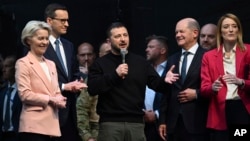On Monday, May 15, Ukrainian President Volodymyr Zelenskyy wrapped up his three-day European tour, reportedly gaining for his nation unwavering diplomatic support from the Vatican, and the governments of Germany, France and Britain, along with substantial military aid from those countries.
Meanwhile, in Russia, hundreds of news reports about Zelenskyy’s visit in Europe came out with identical headlines and context. These reports are designed to reach millions of Russians domestically and abroad.
Citing responses to Zelenskyy’s tweet that announced his arrival in London, U.K. on May 15, the Russian news media claimed:
“Twitter users ridiculed Ukrainian president Zelenskyy’s Europe tour,” as reported by the state-owned news agency RIA Novosti; the main television channels 1 TV and Ren-TV; the popular newspapers Moskovsky Komsomelets, Komsomolskaya Pravda and Argumenty Nedeli; the Russian government’s official newspaper Rossiyskaya Gazeta, and by hundreds regional news outlets across Russia.
These news reports are false.
Russian media fabricated the news report based on six tweets, two of which have either been deleted or never existed. The remaining four display all the characteristics of internet trolling.
Two are from anonymous accounts that have zero to 30 followers, despite being on Twitter since 2009.
The fifth account is also anonymous but verified, and it uses a profanity phrase as its username and tweets mostly adult content.
Only the sixth Twitter account belongs to a real person, one Zimbabwean by the name Tendayi Zinyama who frequently tweets in support of ZANU-PF (Zimbabwe African National Union Patriotic Front) and of Russia’s war in Ukraine.
Often described as “tyrannical” by independent observers, Zimbabwe’s ruling ZANU-PF party also is mired in charges of deep corruption, and it has retained close ties with the Kremlin since the late 1970s. Moscow has been providing its leader Robert Mugabe with military aid and diplomatic support in exchange for access to the country’s natural resources, mainly gold and platinum.
The U.S. State Department said in a 2020 report that the Russian disinformation ecosystem operates on “five pillars that work together to create a media multiplier effect.” One of the pillars of this strategy is the use of “proxy sources that interact with one another to elevate malicious content and create an illusion of credibility,” the report stated.
Zelenskyy’s meetings with the European leaders have been praised by many as highly successful. Amid Russia’s intensified strikes on Ukrainian cities and infrastructure, he asked for the provision of air defense systems and fighter jets. Among the publicly announced results of Zelenskyy’s diplomatic efforts are the U.K.’s promise to supply attack drones and hundreds more missiles, and France’s pledge to provide light tanks, armored vehicles and air defense systems.
The day before Zelenskyy’s visit, the German government announced $3 billion in military aid to Ukraine.





